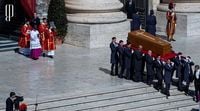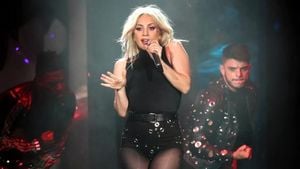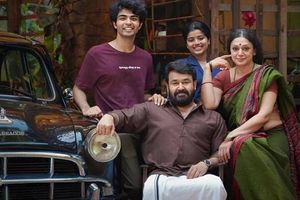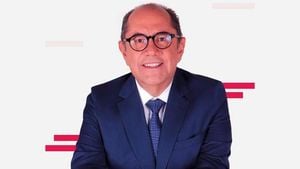On April 26, 2025, the world bid farewell to Pope Francis in a grand yet somber ceremony held in St. Peter's Square, Vatican City. The funeral drew more than 250,000 mourners, including over 50 heads of state and representatives from more than 130 countries, highlighting the global impact of the late pontiff.
Pope Francis, born Jorge Mario Bergoglio in Argentina, passed away on April 21, 2025, at the age of 88 due to a stroke after battling pneumonia. His last public appearance occurred just a day prior, on April 20, when he delivered his traditional Urbi et Orbi blessing to the faithful gathered in St. Peter's Square. His death marks a significant moment in the Catholic Church's history, as he was the first Jesuit pope and the first pontiff from Latin America.
The funeral mass was presided over by Giovanni Battista Re, the Dean of the College of Cardinals, who spoke about the profound legacy Pope Francis left behind, emphasizing his commitment to mercy, peace, and openness. "Pope Francis left a deep mark on the history of the church with his desire for mercy, peace, and openness," Re stated during the service. The ceremony also featured prayers in multiple languages, reflecting the diverse congregation present.
Among the notable figures in attendance were U.S. President Donald Trump, British Prime Minister Keir Starmer, French President Emmanuel Macron, German Chancellor Olaf Scholz, and Prince William representing the British royal family. Former U.S. President Joe Biden, alongside his wife Jill, was also present, as were leaders from Argentina and Brazil, including Javier Milei and Lula da Silva, respectively.
In a notable moment of international diplomacy, Trump and Ukrainian President Volodymyr Zelenskyy used their time in Rome to discuss pressing issues, marking their first meeting since the change in U.S. administration. The two leaders described their discussions as "very productive," indicating the funeral served as a backdrop for significant geopolitical conversations.
Following the mass, Pope Francis was laid to rest in the Basilica of Santa Maria Maggiore, fulfilling a personal wish to be buried outside the traditional location of St. Peter's Basilica. This decision diverged from a century-old practice, reflecting his desire for a simpler burial. His coffin, made of plain wood, rests next to other pontiffs, marked by a modest white marble slab inscribed with his name, "Franciscus," without any mention of his papal title.
As the ceremony concluded, the Vatican officially entered a period known as sede vacante, the time during which the papal seat is vacant. The conclave of cardinals is expected to convene within the next two weeks to elect a new pope, a process that will take place in the Sistine Chapel under strict secrecy.
Amidst the mourning, a separate controversy emerged involving selfies taken by some officials attending the funeral. German politician Markus Zöder, the Prime Minister of Bavaria, faced backlash after posting a selfie before the ceremony, which many deemed disrespectful. Marie-Agnes Strack-Zimmermann, the chairwoman of the Bundestag's defense committee, condemned the act, stating, "Selfies at a funeral are inappropriate. This is not Oktoberfest. At least Zöder wasn't holding a skewer in his hand."
Similarly, Polish officials were criticized for taking selfies during the event. The Vatican's press service shared a photo of the Polish delegation, including President Andrzej Duda and other officials, arriving for the funeral. Shimon Golovnya, the Speaker of the Polish Sejm, defended himself by claiming he was photographing the crowd in St. Peter's Square rather than taking a selfie.
The funeral of Pope Francis not only marked the end of an era but also highlighted the complexities of modern political behavior, even in moments of collective grief. As the Catholic Church prepares for the election of a new leader, the world watches closely, aware that the next pope will face the challenge of navigating the church through a time of significant ideological division.
In recent years, Pope Francis was known for his emphasis on social justice and a progressive stance on various issues, including the environment and global peace. His papacy was characterized by a commitment to modernizing church doctrine and addressing contemporary issues facing society. His passing comes at a time when the Catholic Church is at a crossroads, with ongoing debates about its future direction amidst rising traditionalist and globalist sentiments.
As the faithful reflect on the legacy of Pope Francis, many remember him for his calls for compassion and dialogue in a world often divided by conflict. His unique approach to leadership and commitment to outreach, especially to marginalized communities, left an indelible mark on the church and its followers.
The coming weeks will be crucial for the Catholic Church, as the cardinals gather to select a new pope who will carry forward the teachings and vision of Pope Francis while addressing the challenges that lie ahead. The selection process is expected to be closely scrutinized, not only for the new pope's theological positions but also for how they will respond to the evolving landscape of global politics and church dynamics.




